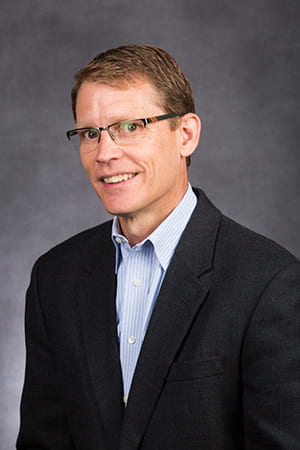Thought Leader: Dr. Matthew Eriksen
Developing Responsible Leaders
Dr. Matthew Eriksen, a professor of management who has been a member of the Providence College faculty since 2008, is a highly regarded scholar in the areas of leadership and leadership development. Here, Eriksen discusses what responsible leadership is and why it’s critical. You can read more in one of his latest journal articles “On developing responsible leadership.”

What is it about the topic of responsible leadership that interests you? This is something you’ve focused on for some time, what’s held your curiosity?
On a personal level, a major part of my identity is being a responsible person. But, it is something that I have struggled at times. So, on a most basic level, this topic interests me because I want to be responsible.
Over my 18 years of attempting to develop leaders, I have come to believe – like many philosophers and psychologists – that to be a responsible person is how we realize our human potential. Because we can be aware of ourselves, we can think about the past and project ourselves into the future. Unlike other living beings, we can be responsible for ourselves, our impact on others, and the world we co-construct with others through being “responsible able.” Although we are most often habitually and unconsciously reacting throughout our day, as Viktor Frankl said “Between stimulus and response there is a space. In that space is our power to choose our response. In our response lies our growth and our freedom.” This to me is the essence of being of responsible human being and a leader.
‘Response-ability’ has an interesting depth (self-reflexivity and reflection). Why is this quality necessary for the leadership you envision?
I believe living is inherently a relational-responsive process in which we are constantly responding to what is in the present moment. Leading is inherently about intentionally trying to impact how the future unfolds to fulfill a vision and purpose. It seems to me that the most important ability to being a responsible and effective leader is to continuously attempt to choose one’s response when leading, rather than reacting based on our past habits and unconscious responses. Leaders respond to fulfill their purpose, achieve their goals, and practice their values.
In some ways, what you’re teaching to students on this subject is an old trope – that practice makes perfect (or at least makes a leader stronger through listening, emotional intelligence, etc.). Is it possible for this journey through self-reflection to ever end?
As we are continuously “becoming” and each moment in which we find ourselves in is unique, the practices of reflection and self-reflexivity allow us to increase our self-awareness of who we are becoming and enables us to continuously be responsible leaders.
There were some fascinating nuggets throughout this. One, in particular, was this: ‘Each time one responds to another person, one impacts this person, one’s unfolding relationship with this person, and the realty they co-construct.’ What are your thoughts on the practicality of that – especially as it pertains to two-way conversation between people from different backgrounds.
This points to the relational-responsive nature of life. We are continuously responding to some stimuli in the present moment, and, as a leader, this is most often another human. So, rather than acting within an unchanging reality, we are actively participating in constructing an emerging reality. We present a stimulus to which others must respond. Thus, we are actively participating in who others are becoming, as who they are becoming is determined by how they respond. This leads to the insight that you can always change a relationship of which you are part by acting and being different than your past. You can’t determine what exactly the relationship will become, but you can influence its direction.
Tell me why your findings are useful? At a foundational level, what’s necessary for ‘leaders’ to do to fulfill the tenets you wrote about?
These findings point to the reason of why we seem to have so many leaders behaving irresponsibly in spite of the increasing efforts we have made to develop them. Evidence suggests that even when leaders engage in developmental opportunities, they have little impact on leaders being responsible in their day-to-day lives because we don’t help leaders increase their response-ability through increasing their self-awareness and awareness of the experience. These leadership development opportunities are not developed based on the nature of human beings and taking into account the relational nature of reality. Ultimately, to be a responsible leader, one needs to be able to choose one’s response within one’s unfolding interactions with others.
Listen to Professor Eriksen’s Podcast on Leadership




